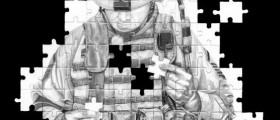
A person suffering from OCD (Obsessive Compulsive Disorder) is a persona who believes that an illogical sequence of events will occur if he or she doesn't adhere to the ritual that is OCD. He or she may also be under the impression that this sequence of events is governed by a higher force, a supernatural being, an alien intelligence, or similarly. In addition, he or she doesn't need to address the supernatural force as as specific being, but the person may alternative merely act as if the scenario was set out as such – that is to say treat it in an abstract fashion.
Examples and Treatment
One of the examples of this would be a distinct belief that the death of a loved one may come to pass immediately after, and for reason no further than the person suffering from OCD, not washing his or her hands a specific number of times a day, or, alternative, at regular time intervals – which may become incredibly accurate.
This kind of disorder is further extended by the component which heightens the likability of such an event coming to pass – that is to say, in the mind of the OCD patient, this event will most certainly occur.
This is where cognitive therapy kicks in just nicely. Namely, the goal of cognitive therapy is to change false, or distorted belief systems. And it is done by various means of shedding light on the reality of these events.
The methods may alternatively be “Socratic”, which means that the doctor constantly questions the patient about the realities of these events, until the patient, concludes that they make no sense at all.
“Behavioral experiments” are also a common method. Simply put, during these, a patient is encouraged to test new, possible, responses which may result as reacting differently within the same scenario.
Cognitive therapy aims to challenge faulty beliefs along the lines of following quoted statements: I must have guarantees, I cannot stand the anxiety, I must not make mistakes, I am responsible for causing harm, I am responsible for not preventing harm done to others, I will feel responsible if a bad thing happens if I fail to control my thoughts, bad things will happen if I don't control my thoughts, failing to control my thoughts means that I am inadequate, I will be punished if I don't control my thoughts, thinking is the same as acting, is it terrible to make the wrong decision, there is a right and wrong in every situation, I must have complete control over all events at all times, I am in continuous danger, I am responsible for others, I must be perfect, I have to be on guard at all the time, etc.
The previous quotes also show that the OCD patient may not only believe that he or she may cause a terrible event by failing to respond in a particular way within certain completely unrelated scenarios. Namely, they show that the patient may have trouble telling apart actions from thoughts, the problem further providing the patient with a unique belief system within which the border between the world of thoughts and reality is somewhat dimmed.
Cognitive therapy is also used to remade patients with “intrusive thoughts”, as in thoughts he or she may feel has no power over.
Results may take more effort and time than it would seem, but it is clearly obvious that they are well worth it – every last bit.




-Causes,-Symptoms,-Diagnosis-And-Treatment_f_280x120.jpg)











-Causes,-Symptoms,-Diagnosis-And-Treatment_f_280x120.jpg)
Your thoughts on this
Loading...